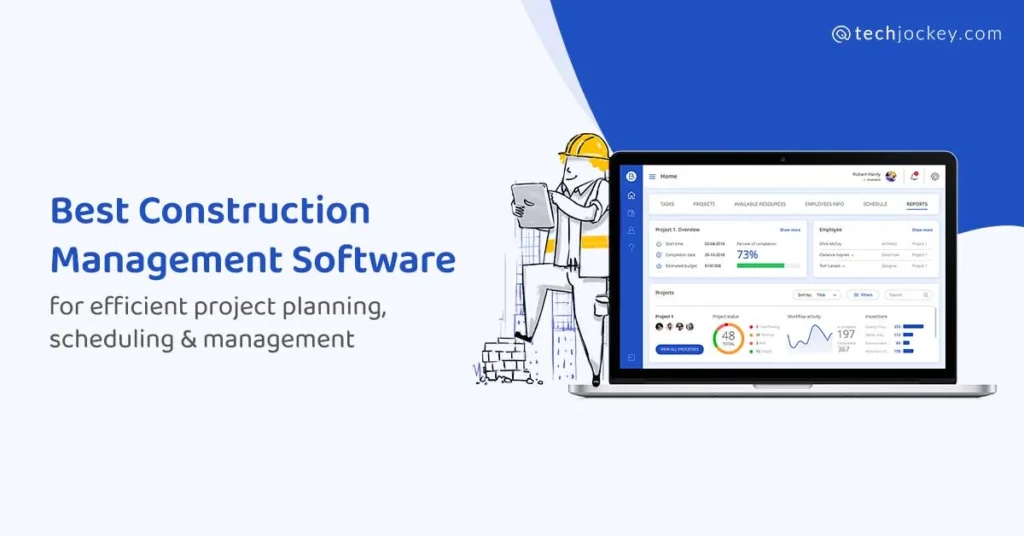
Construction Project Management Software
Outline of the Article
H1: The Ultimate Guide to Construction Project Management Software
H2: Introduction
- Importance of construction project management
- Overview of software solutions
H2: What is Construction Project Management Software?
- Definition and purpose
- Key features and functionalities
H3: Benefits of Using Construction Project Management Software
- Improved efficiency and productivity
- Enhanced collaboration
- Better budgeting and cost management
H2: Key Features of Construction Project Management Software
- Project planning and scheduling
- Document management
- Resource allocation
- Reporting and analytics
H3: Project Planning and Scheduling
- Tools and techniques for effective planning
- Gantt charts and timelines
H3: Document Management
- Centralized document storage
- Version control and access management
H3: Resource Allocation
- Tracking manpower and equipment
- Optimization of resources
H3: Reporting and Analytics
- Real-time insights and dashboards
- Importance of data-driven decisions
H2: Popular Construction Project Management Software Solutions
- Overview of leading software options
- Comparison of features and pricing
H3: Procore
- Key features and advantages
H3: Buildertrend
- Target audience and unique offerings
H3: CoConstruct
- Best for custom home builders
H3: Microsoft Project
- Integration with other Microsoft tools
H2: Choosing the Right Software for Your Needs
- Factors to consider
- Budget and scalability
H2: Implementing Construction Project Management Software
- Best practices for successful implementation
- Training and support
H2: Conclusion
- Recap of the benefits
- Future trends in construction project management software
H2: FAQs
- What is the average cost of construction project management software?
- How can construction project management software improve project efficiency?
- Is construction project management software easy to use?
- Can these tools be integrated with other software?
- What are the security features to look for?
The Ultimate Guide to Construction Project Management Software
Introduction
Have you ever been part of a construction project that felt like it was spinning out of control? If so, you’re not alone. Managing construction projects can be a daunting task, especially when juggling multiple stakeholders, tight deadlines, and budget constraints. This is where construction project management software comes into play. It acts as a lifeline, helping project managers keep everything organized and on track.
In this guide, we’ll explore what construction project management software is, its benefits, key features, popular options, and how to choose the right one for your needs. So grab a cup of coffee, and let’s dive in!
What is Construction Project Management Software?
Definition and Purpose
Construction project management software is designed to assist project managers and teams in planning, executing, and closing construction projects efficiently. The primary purpose of this software is to streamline processes, enhance collaboration, and ensure that projects are completed on time and within budget.
Key Features and Functionalities
These software solutions come equipped with various features that cater specifically to the needs of the construction industry. From project scheduling and budgeting to document management and resource allocation, these tools provide comprehensive support to project teams.
Benefits of Using Construction Project Management Software
Improved Efficiency and Productivity
One of the most significant advantages of using construction project management software is the boost in efficiency and productivity it provides. By automating routine tasks, teams can focus on more critical aspects of the project, leading to faster completion times and reduced costs.
Enhanced Collaboration
Effective communication is key to successful project management. Construction project management software often includes collaboration tools that allow team members to share updates, documents, and feedback in real time, reducing misunderstandings and keeping everyone on the same page.
Better Budgeting and Cost Management
Budget overruns are common in construction projects. This software allows project managers to track expenses, forecast costs, and make informed decisions that help keep the project within financial constraints.
Key Features of Construction Project Management Software
Project Planning and Scheduling
Project planning is crucial for success. Construction project management software typically includes tools for creating detailed project plans, timelines, and schedules. Gantt charts are a popular feature that visually represents the project timeline, making it easy to see task dependencies and milestones.
Document Management
Managing documents in construction can be overwhelming, especially with the numerous contracts, blueprints, and reports involved. These software solutions offer centralized document storage, allowing users to easily access, share, and manage project documents.
Resource Allocation
Proper resource allocation is essential to avoid delays and minimize costs. Construction project management software enables project managers to track manpower, equipment, and materials, ensuring that resources are utilized effectively.
Reporting and Analytics
Data-driven decisions lead to better project outcomes. Most construction project management software includes reporting and analytics tools that provide real-time insights into project progress, budget status, and resource usage, helping managers make informed decisions.
Popular Construction Project Management Software Solutions
Overview of Leading Software Options
With many options available, choosing the right construction project management software can be challenging. Here’s a look at some of the most popular solutions on the market today.
Procore
Procore is a robust platform that offers a wide range of features for project management, including budgeting, scheduling, and collaboration tools. Its user-friendly interface and mobile app make it easy for teams to stay connected on the go.
Buildertrend
Buildertrend is tailored for residential construction and remodeling. It provides tools for project management, customer management, and financial management, making it ideal for contractors looking to streamline their operations.
CoConstruct
CoConstruct is designed specifically for custom home builders and remodelers. It offers unique features like client selections and budgeting tools, helping builders manage projects from start to finish.
Microsoft Project
While not exclusive to construction, Microsoft Project is a powerful project management tool that integrates seamlessly with other Microsoft applications. It’s suitable for organizations already using the Microsoft ecosystem.
Choosing the Right Software for Your Needs
Factors to Consider
When selecting construction project management software, consider your organization’s size, budget, and specific needs. Do you require features like mobile access or advanced reporting? Make a list of must-have features to guide your decision.
Budget and Scalability
Budget constraints are common in construction. Evaluate the pricing of different software options, keeping in mind that some may offer tiered pricing based on the features you need. Additionally, choose a solution that can scale with your business as it grows.
Implementing Construction Project Management Software
Best Practices for Successful Implementation
Implementing new software can be daunting, but following best practices can ensure a smooth transition. Start with a detailed implementation plan, engage stakeholders, and allocate sufficient time for training.
Training and Support
Investing in training for your team is crucial for maximizing the benefits of construction project management software. Ensure that users know how to navigate the software and take advantage of its features. Many software providers offer training resources, including webinars and tutorials.
Conclusion
In today’s fast-paced construction industry, leveraging technology is not just an option; it’s a necessity. Construction project management software can significantly enhance efficiency, collaboration, and overall project success. By choosing the right software for your needs and implementing it effectively, you can set your projects up for success and drive your business forward.
FAQs
What is the average cost of construction project management software?
The cost can vary widely depending on the features and number of users. Generally, prices range from $20 to $500 per user per month.
How can construction project management software improve project efficiency?
By automating tasks, enhancing communication, and providing real-time insights, the software helps teams work more effectively and make informed decisions.
Is construction project management software easy to use?
Most modern solutions are designed with user-friendliness in mind, featuring intuitive interfaces and helpful support resources. However, the ease of use can vary, so it’s essential to assess this during your selection process.
Can these tools be integrated with other software?
Many construction project management software solutions offer integrations with popular tools like accounting software, design applications, and collaboration platforms.
What are the security features to look for?
Key security features include data encryption, user authentication, and role-based access control to ensure that sensitive project information remains protected.
I hope this article provides you with a comprehensive understanding of construction project management software and how it can benefit your projects! If you have any further questions or need assistance, feel free to ask.
